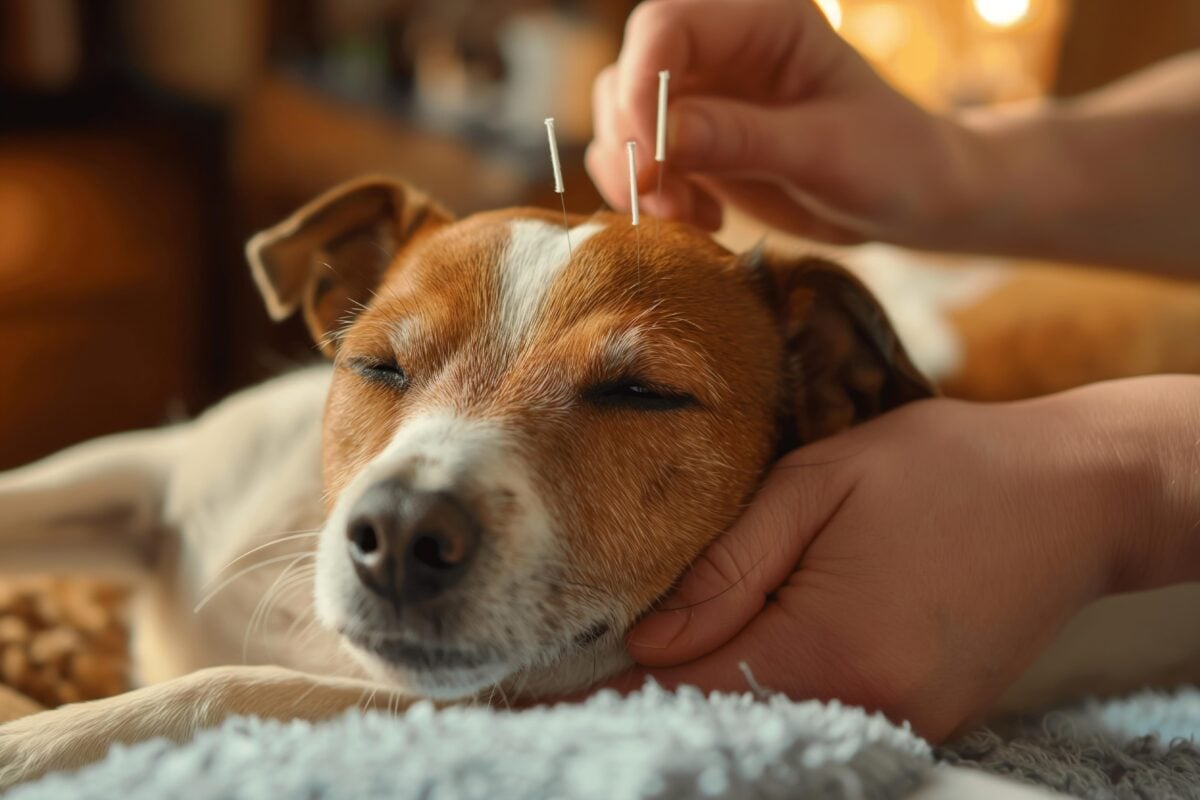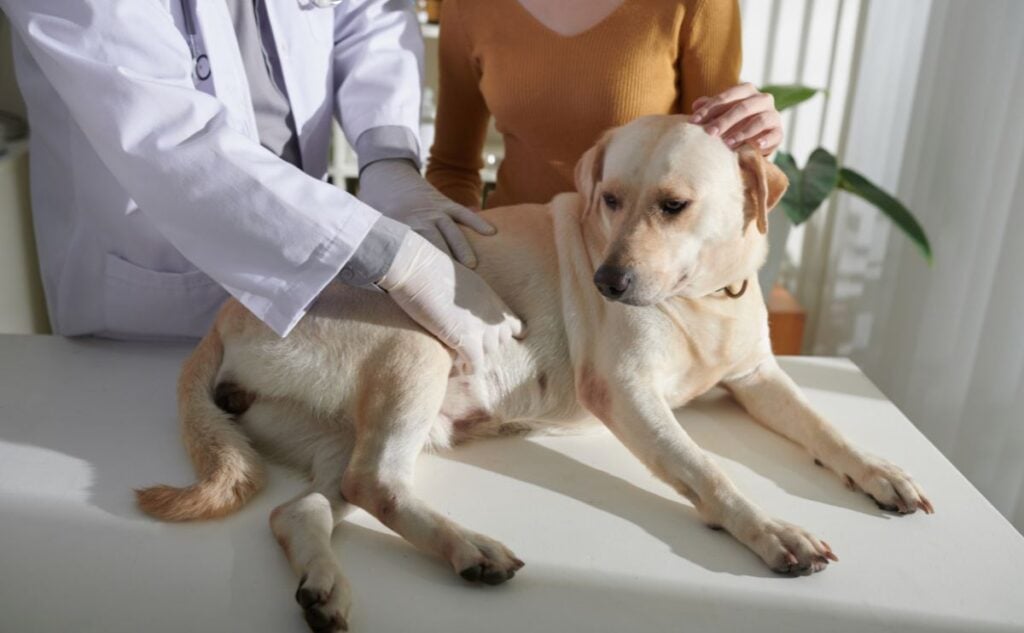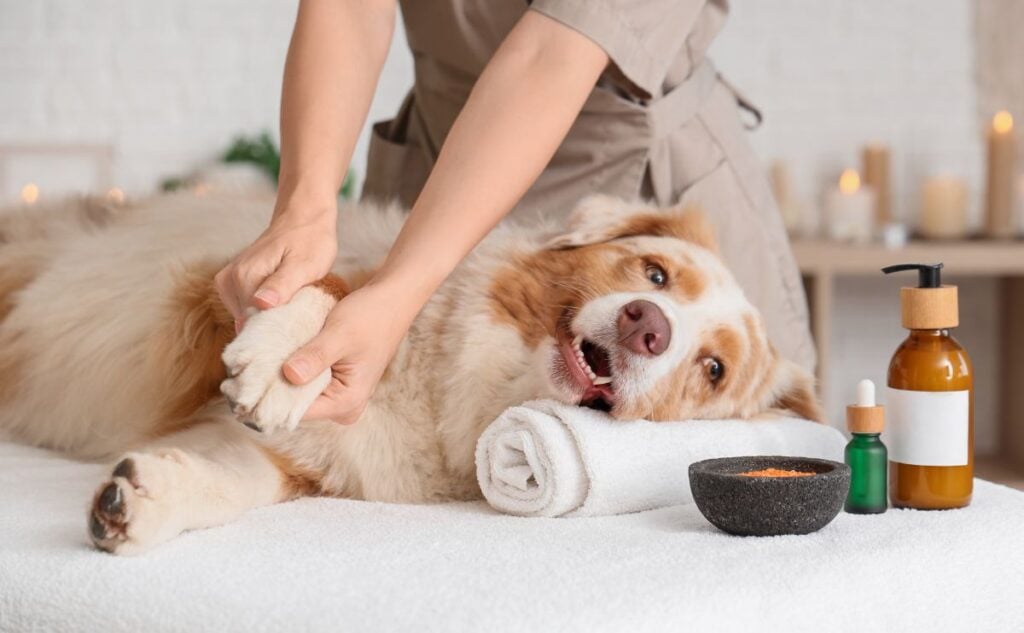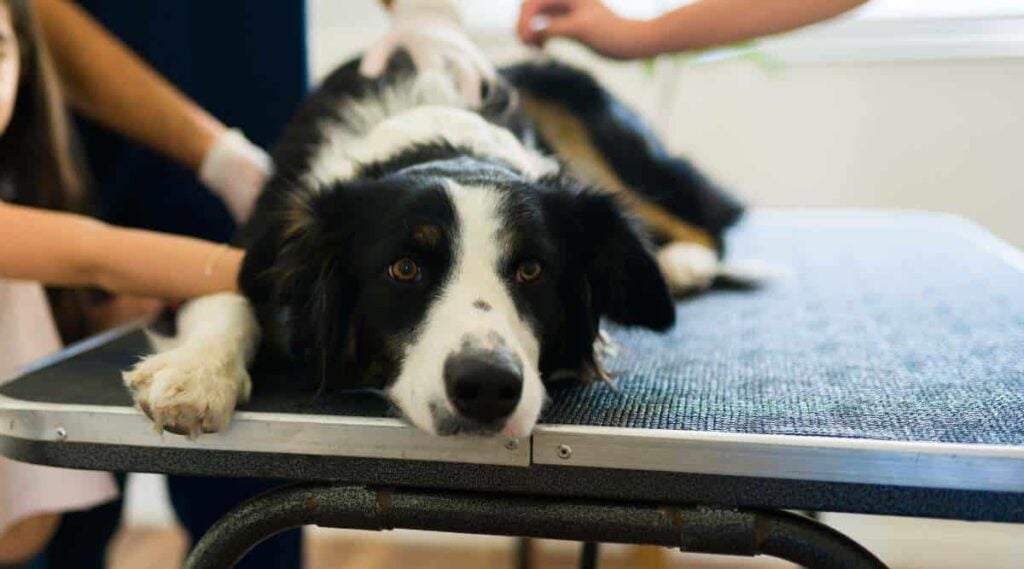Acupuncture For Dogs?! Here’s Why Vets Are Actually Doing This
When you purchase through links on our site, we may earn a commission. Here’s how it works.
Yes, vets are actually sticking needles in dogs, and it’s not a joke. More and more clinics are offering acupuncture for dogs to treat arthritis, anxiety, back pain, and even post-surgery recovery.
Table of Contents
It sounds bizarre, but this ancient practice is helping pups get off meds and back to zoomies. Here’s exactly what it does, how much it costs, and whether it could help your dog.
Why Are Vets Sticking Needles in Dogs?!
It looks insane, but it’s a real treatment with surprising results.
Acupuncture for dogs might sound like a viral wellness gimmick, but it’s a legit, vet-approved therapy used to treat pain, inflammation, stiffness, and even anxiety in pets.

Just like acupuncture for humans, it works by inserting super-thin needles into specific points on your dog’s body (where nerve bundles and blood vessels meet) to stimulate blood flow, release natural painkillers, and rebalance their nervous system.
Pet acupuncture can help with many things. Some of the possibilities include its ability to:
- Stimulate the body to relieve pain and release anti-inflammatory substances
- Relax muscles where the needle is inserted, which results in relieving local pain
- Improve blood flow and oxygenation
- Remove metabolic wastes and toxins
It’s part of a growing wave of holistic vet care, and while it used to be rare, now thousands of vets across the U.S. offer canine acupuncture, especially for dogs with chronic pain or mobility issues.
Additionally, there are no side effects for your pet’s internal organs (unlike over-the-counter medicine), which is why many pet parents are turning to it.
Quick Takeaway: Dog acupuncture = tiny needles + natural healing. No meds, no surgery, no weird side effects.
Does Dog Acupuncture Actually Work?
Short answer: sometimes, yes, sometimes, no. But for some, it works shockingly well.
Plenty of pet parents were skeptical too… until their dogs started moving, sleeping, and even playing better after a few sessions. Watch this short video showcasing Milly the Great Dane’s success story.
While every dog responds differently, many owners report improvements in:
- Arthritis and joint pain
- Anxiety, stress, and nervous behavior
- Back and neck issues, such as intervertebral disc disease (IVDD)
- Allergies and inflammation
- Recovery after injury or surgery
What The Science Says About It
No, it’s not just crunchy dog mom voodoo. While dog acupuncture might look like a trendy pet spa thing, there’s actual veterinary research backing it up, especially for pain, inflammation, and spinal injuries.
Here’s what science says:
- A study in BMC Veterinary Research showed that dogs with IVDD had an almost 80% recovery rate when treated with acupuncture and rehab.
- Another review in PubMed Central found significant pain reduction in dogs with musculoskeletal issues using electroacupuncture.
- Some vets even use electrostimulation (Estim) with acupuncture needles to treat nerve damage, arthritis, and chronic back pain.
Acupuncture for dogs is not a cure-all, but more vets are recommending it as a safe, drug-free option for dogs who don’t respond well to medication or surgery.
What Happens During a Dog Acupuncture Session? 4 Steps
Spoiler: there are treats involved, and no, it doesn’t hurt.
Dog acupuncture might sound intense, but the vibe is closer to a calm “puppy spa day” than anything clinical. Sessions are quiet, stress-free, and most dogs get treats, belly rubs, and maybe even a nap while the needles do their work.
Here’s what a typical session looks like:
1. Check-In & Evaluation
When you arrive, the veterinarian, who is always a Certified Veterinary Acupuncturist (more on this later), performs a thorough physical assessment. This includes:
- Watching how your dog walks or moves
- Checking posture, gait, and flexibility
- Feeling along muscles and joints to identify pain points
- Asking about energy levels, appetite, and behavior changes

This helps the vet customize a treatment plan based on your dog’s specific condition, whether it’s arthritis, IVDD, anxiety, allergies, or post-surgery rehab.
Many holistic veterinarians also assess factors such as diet, stress levels, and overall well-being, so it’s more than just a physical exam.
2. Needle Placement
Next, the vet gently inserts ultra-thin, sterile needles into specific acupuncture points on your dog’s body. These needles are about the width of a human hair and cause little to no discomfort.
Most dogs:
- Barely notice the needles going in
- Stay calm or lie down
- React more to the treat bag than the treatment
If your dog is nervous or squirmy, some veterinarians may start with fewer needles or use non-invasive options, such as acupressure or laser acupuncture.
3. Chill Time
Once the needles are in place, your dog can relax.
- Many dogs lie down comfortably
- Some fall asleep completely
- Others just calmly wait while being petted or enjoying a treat
The goal during this time is to activate blood flow, reduce inflammation, release endorphins, and stimulate the nervous system in a balanced, natural way.

Studies show that acupuncture points in dogs often align with nerve centers and connective tissue, similar to what is observed in human acupuncture.
4. Post-Treatment Glow
After the needles are removed, most dogs leave the clinic either sleepy and relaxed or noticeably more energetic. Depending on the condition being treated, your vet might recommend:
- 1–2 sessions per week to start
- Tapering to monthly maintenance once symptoms improve
- Ongoing treatment for chronic or age-related issues
Many owners report noticeable changes after just 1–2 visits, especially with anxiety, stiffness, or post-injury recovery.
There’s no sedation, no recovery time, and dogs can resume normal activities right after the session.
Quick Takeaway Box
- Session Length: 30–45 minutes
- Average Cost: $50–$300 per session
- Comfort Level: High, most dogs relax, some nap
- Side Effects: Rare to none (some dogs may be sleepy afterward)
Does Canine Acupuncture Hurt?
Most dogs don’t even flinch. If you’re picturing your pup yelping or squirming, you’re not alone, but that’s not how this works. The needles used in acupuncture for dogs are super thin, flexible, and inserted just under the skin. They’re nothing like the sharp hypodermic needles used for shots or blood draws.
What usually happens instead? Dogs get comfy. Some even melt into the floor like they’re having the best nap of their lives.

Veterinarians often pair acupuncture with soft bedding, calming music, and treats, such as peanut butter, to help dogs settle in. The entire environment is designed to be relaxing, not clinical or stressful. In fact, once the needles are in, most dogs stay so calm that their humans are more freaked out than they are.
Takeaway: For the vast majority of dogs, acupuncture doesn’t hurt at all, and many look forward to it once they’ve had a few sessions.
Not Just Needles: 7 Alternatives That Help Too
If the idea of needles still makes you nervous, or your dog’s just not having it, don’t worry. Many holistic vets offer non-needle alternatives that tap into your dog’s natural healing systems.
These treatments are often used alongside or instead of acupuncture to help manage pain, mobility issues, and anxiety. Here are seven effective options worth knowing about:
1. Acupressure
Acupressure is similar to acupuncture but uses gentle pressure instead of needles.
Vets or trained pet owners apply targeted finger pressure to specific points on the body to relieve pain, reduce stress, and support organ function. It’s a great option for dogs who are needle-sensitive or anxious. Some owners even learn simple acupressure routines to do at home between visits.
2. Laser Acupuncture
This method uses low-level laser beams to stimulate acupuncture points without piercing the skin. The lasers are not hot. They are cool, so there is no burnt skin or hair.
It’s completely painless and non-invasive, making it ideal for dogs that are nervous or have sensitive areas that can’t tolerate needles. Despite the sci-fi name, the technology is widely used in veterinary rehab clinics.
3. Electrostimulation (Estim)
Electrostimulation sends gentle electrical pulses through pads or acupuncture needles to activate nerves and boost circulation.
It’s commonly used for dogs with arthritis, back issues, or partial paralysis. Most dogs don’t feel anything unpleasant, just a slight tingling at most.
4. Herbal Medicine for Dogs
Some holistic vets use Chinese herbal formulas to complement physical treatments. These herbs are chosen based on your dog’s condition and may help reduce inflammation, ease digestion, or balance hormones.
They’re especially useful for chronic conditions that don’t respond well to conventional meds. Always work with a vet certified in herbal medicine and never give herbs without guidance.
5. Tui-na
Tui-na is a traditional Chinese medical massage combining acupressure, stretching, and joint manipulation.
This canine massage therapy is used to enhance mobility, alleviate pain, and soothe the nervous system. It’s especially beneficial for older dogs or pups recovering from injury or surgery.

6. Moxibustion
Moxibustion is a heat-based therapy where dried herbs (typically mugwort) are burned near acupuncture points to warm the area and promote energy flow. It’s often used in dogs with joint stiffness, cold sensitivity, or arthritis, especially in the winter months.
Although it may sound unusual, moxibustion is a long-standing practice in traditional Chinese medicine and is often combined with acupuncture or massage.
7. Aquapuncture
Sterile fluid (usually vitamin B12 or saline) is injected into acupuncture points using a small needle. The effects last longer than dry needling and are often used for mobility or inflammation issues.
Yes, it’s still technically a needle, but it’s an alternative to consider.
Here’s a quick comparison table:
| Method | Involves Needles? | Often Used For |
|---|---|---|
| Acupressure | No | Anxiety, mild pain |
| Laser Acupuncture | No | Sensitive dogs, inflammation |
| Electrostimulation | Sometimes | Nerve damage, arthritis |
| Herbal Medicine | No | Chronic issues, internal balance |
| Tui-na Massage | No | Mobility, stress, recovery |
| Moxibustion | No | Stiffness, cold-sensitive joints |
| Aquapuncture | Yes | Long-lasting relief |
How Much Does Dog Acupuncture Cost?
Dog acupuncture isn’t cheap, but it’s often more affordable than long-term meds or surgery. Prices can vary based on your location, your veterinarian’s certification, and whether you’re visiting a specialty clinic or a general practice that offers holistic care.

The price of acupuncture for dogs can range anywhere from $50 to $300 per session. Acupuncture is typically administered about three times a week during the initial weeks.
Some pet insurance providers offer coverage for acupuncture. Read our article to find out more about pet insurance.
3 Signs Your Dog Might Be a Good Fit for Acupuncture
Not every dog requires acupuncture, but for some, it can be a life-changing experience. Vets often recommend it when traditional treatments aren’t enough, or when pet parents want to avoid long-term medications or invasive procedures.
There are three signs your dog might benefit from acupuncture:
1. Chronic Pain or Stiffness
If your dog has arthritis, hip dysplasia, or other joint issues that limit mobility, acupuncture can reduce inflammation, improve circulation, and ease pain, especially in senior dogs.
Look for:
- Difficulty standing up
- Hesitating on stairs
- Limping after walks
- Slow, stiff movements in the morning
2. Anxiety or Stress-Related Behaviors
Acupuncture can help regulate the nervous system and trigger natural calming responses. It’s often used for dogs who suffer from:
- Noise phobias (like thunderstorms or fireworks)
- Separation anxiety
- General nervousness or hyperactivity
- Travel or vet visit stress
3. Recovery from Surgery or Injury
Many vets use acupuncture to speed healing after orthopedic procedures or injuries. It can reduce swelling, relieve post-op pain, and help dogs regain mobility faster.
Ideal for:
- Post-knee surgery recovery (e.g., CCL tears)
- Spinal issues (e.g., IVDD)
- Muscle or nerve trauma
- Rehab cases that aren’t progressing with standard care

When Acupuncture Makes Sense
- You want to avoid long-term medications
- Your dog isn’t a good surgical candidate (due to age or cost)
- Other treatments aren’t giving lasting results
- You want to add a natural, vet-supported therapy to your plan
Acupuncture often works best when combined with physical therapy, supplements, or laser treatments, especially in complex cases like IVDD, arthritis, or long-term anxiety.
How to Find a Certified Canine Acupuncturist Near You
Not every vet is trained in acupuncture, and you definitely don’t want someone winging it with needles. To receive safe and effective treatment, always look for a practitioner with formal training in veterinary acupuncture.
A Certified Veterinary Acupuncturist (CVA) has completed specialized training through accredited programs like:
- Chi University (Chi Institute)
- International Veterinary Acupuncture Society (IVAS)
- College of Integrative Veterinary Therapies (CIVT)
You should also verify that the vet is licensed and practicing under veterinary supervision in your state. You can also ask your vet if they work with a CVA.
Questions to Ask Before Booking
- What are your credentials?
- What conditions do you commonly treat with acupuncture?
- How many sessions do most dogs need?
- Do you combine acupuncture with other therapies (like laser or massage)?
- What should I expect during my dog’s first visit?
- How much does each dog acupuncture session cost?
Many practices offer a free phone consult or discounted first visit if you’re curious but not fully committed yet.
FAQs About Dog Acupuncture
Still have questions? You’re not alone. Here are answers to some of the most frequently asked questions pet parents have about trying acupuncture for their dog.
Have a question I didn’t cover? Drop it in the comments, because we’re always adding updates.

Is Acupuncture Safe for Dogs?
Yes, when performed by a Certified Veterinary Acupuncturist, acupuncture is considered safe. Side effects are rare and typically mild, such as temporary drowsiness or slight soreness at the injection sites. Always work with a licensed vet trained in acupuncture.
What Are The Benefits of Canine Acupuncture?
Acupuncture can help support your dog throughout various life stages and address a range of health conditions.
It is commonly used to treat symptoms in dogs suffering from arthritis, degenerative joint disease, allergies, asthma, gastrointestinal issues, incontinence, chronic pain, trauma (i.e., surgery, falls), cancer, or metabolic disease. The goal is to help the body heal by correcting energy (or chi) imbalances.
How Often Should a Dog Get Acupuncture?
It depends on the condition being treated. Many dogs start with 1–2 sessions per week for the first few weeks, then move to maintenance treatments every few weeks or monthly. Chronic issues may require longer-term care.
Does Acupuncture Replace Medication or Surgery?
Not usually. Acupuncture is often used in conjunction with traditional treatments, not as a substitute for them. It can reduce reliance on pain meds or speed recovery after surgery, but it’s not a substitute for procedures when they’re medically necessary.
How Long Does It Take to See Results?
Some dogs respond after just one or two sessions, especially for stress or mild stiffness. More complex or chronic conditions may take 3–5 sessions to show clear improvements. Your vet will adjust the treatment plan based on your dog’s progress.
Will My Dog Really Tolerate It?
Surprisingly, yes. Most dogs stay relaxed during treatment, and many even fall asleep. The needles are extremely thin, and the process is often paired with treats, petting, and calm surroundings to help your dog feel at ease.
Can I Do Dog Acupuncture at Home?
No, acupuncture should only be performed by a trained veterinary professional. However, your vet may teach you acupressure techniques or recommend other at-home wellness support between visits.
Is It Covered by Pet Insurance?
Some pet insurance plans cover acupuncture under the categories of “alternative” or “complementary therapies.” Check your provider’s policy details or contact them directly to confirm coverage.
Looking for More Natural Ways to Help Your Dog Feel Better?
Acupuncture is just one piece of the puzzle when it comes to holistic healing for dogs. Many pet owners are combining treatments to support long-term comfort, mobility, and wellness.
CBD has become a popular natural remedy for pain and anxiety in dogs, offering gentle relief without the side effects of traditional medications. CBG, a lesser-known cannabinoid, is gaining attention for its potential anti-inflammatory and neuroprotective benefits, especially in dogs with mobility or nerve issues.
Holistic dog food focuses on whole, natural ingredients that can reduce inflammation, improve digestion, and support immune health from the inside out. Hydrotherapy is another low-impact option that helps dogs build strength, improve joint mobility, and recover from injuries without overstressing their bodies.
Tell Us Your Dog’s Acupuncture Story! Tried acupuncture or another holistic treatment for your pup? Whether it worked wonders or didn’t do much, we want to hear about it, so please drop your story in the comments.



